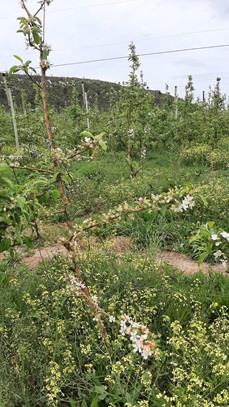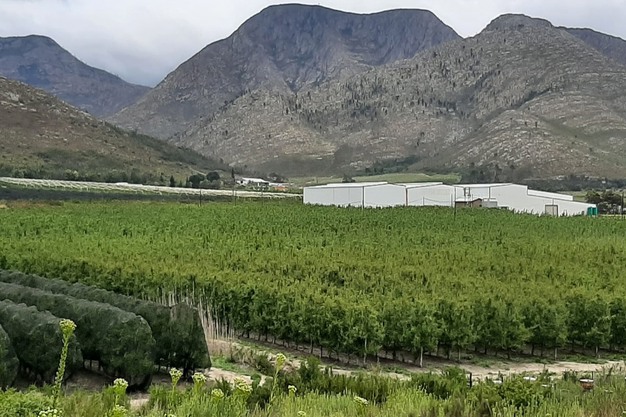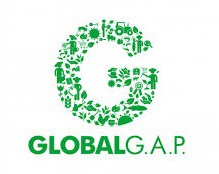 "Five years ago, we had to explain the concept of sustainability. Today everyone knows, and five years from now, it will be your licence to trade," says Johan Cronjé, GLOBALG.A.P. lead product developer. At the recent South Africa tour stop, he implored producers from Southern Africa to become part of the conversation within the Environmental Sustainability Solution (ESS) working group.
"Five years ago, we had to explain the concept of sustainability. Today everyone knows, and five years from now, it will be your licence to trade," says Johan Cronjé, GLOBALG.A.P. lead product developer. At the recent South Africa tour stop, he implored producers from Southern Africa to become part of the conversation within the Environmental Sustainability Solution (ESS) working group.
Right: a Langkloof apple orchard supporting wide biodiversity
For South African producers, scope 3 emissions – all the emissions associated with international trade – will become a major consideration and not as clear-cut as it might look.
"Scope 3 emissions is where it gets tricky. In this category go all the emissions associated, not with the company [the overseas buyer] itself, but emissions that the organisation is indirectly responsible for, up and down its value chain. For example, from buying products from its suppliers, and from its products when customers use them. Emissions-wise, Scope 3 is nearly always the big one."
The idea of scope 3 emission reporting might be daunting to South African farmers, due to the greenhouse gas emissions associated with shipping but there are nuances: "The flower sector has, however, shown that care should be taken to make assumptions. A study done in 2018 indicated that greenhouse gas emissions from the air transport of roses from overseas (Kenya) were four to six times lower than those from heating the greenhouses in the Netherlands."
Many retailers and traders, importers or packers have also committed to Science-Based Targets (SBTi), and both the EU's Corporate Sustainability Reporting Directive (CSRD) and SBTi have scope 3 reporting obligations. Traders, retailers and allied industries will need to provide these results for the production of the raw materials that they purchase.
EU Green Deal
The EU Green Deal provides the overarching framework for the EU's sustainability efforts through initiatives like the Corporate Sustainability Reporting Directive and the Farm to Fork Strategy.
"From 2025 (some reporting element have been postponed), using 2024 figures, European retailers (listed companies) will have a legal obligation to complete and submit Corporate Sustainability Reports. The requirement also applies to many of the larger importers/traders/packers. Many among them have also committed to Science Based Targets (SBTi), with its scope 3 reporting obligations, so they will need to provide results for the production of the raw materials that they purchase."
The Corporate Sustainability Reporting Directive also applies to non-European companies with a turnover of over 150 million euros in the EU (among other requirements) to be adopted from mid-2026. The aim of the ESS under development is a one-stop shop solution for producers when it comes to environmental sustainability, and one auditor through the gate at the farm.
Finding use for the data
"We are fully aware of the increasing audit burden and resulting audit fatigue farmers are facing," Cronjé acknowledges. "We therefore aim to make the environmental sustainability solution as flexible as possible, based on double materiality principles which acknowledge not only financial but societal and environmental risks and opportunities."
Data sharing and reporting is a very sensitive issue. Privacy and safety of data is not negotiable. The farmers always remain the owner of the data and have the final say of what can be done with it.
"We also believe that data collected could and should be to the benefit of the farmer beyond enabling regulatory requirements and reporting. A good example is our IDA tool developed for the flower and ornamental sector, which gives a producer reports on his or her performance relating to their peer groups on the indicators collected, for example on the usage of fertilizer and plant protection products."
To further ease the burden of audits on producers, a workers' wellbeing solution has been developed to cover the gap that existed to govern the activities of subcontracted workers on farms and in packhouses.
Let tech shoulder some of the audit burden
Cronjé, who trained as an agronomist, advises farmers to trust the science because farmers have been practising similar well-studied principles under other names - no-till and conservation agriculture – for decades.
Also, he says, trust the technology which has already become an integral part of farming: automated or remote-tracking of soil moisture levels, biomass and water stress, the route and application rates of a sprayer, and feeding the acquired data into decision-making. "Integrating smartphone technology into farm management systems can have a huge impact on the audit burden, as real time recording and reporting can eventually shorten the time spent on farm by the auditor."
There will always be a need for certification bodies, he said, but he expects the checklists of the future to look "totally different: the auditor will not be looking at admin. One possible future is where AI checks the data and raises the red flags to be checked by the auditor. The auditor would not need to spend time in the office going through paperwork, and she or he can audit four or five farms per day. These are my thoughts on what auditing could look like in the future."
For more information:
Johan Cronjé
GLOBALG.A.P.
Email: [email protected]
https://www.globalgap.org/
